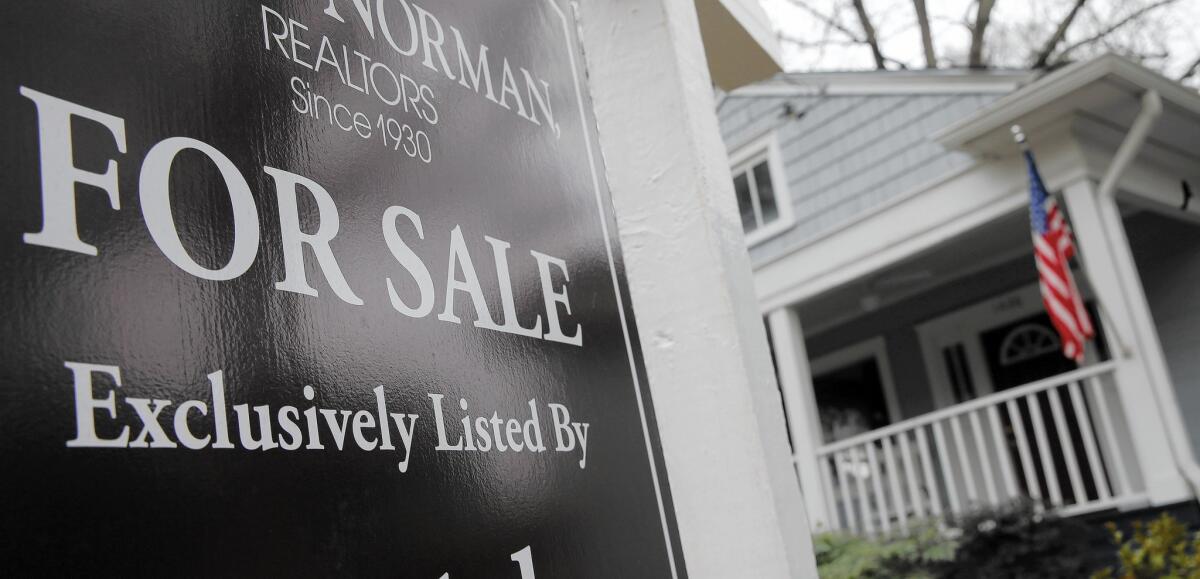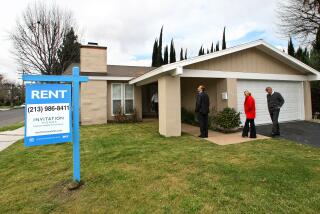Zillow stops buying homes, citing the coronavirus

- Share via
Zillow will temporarily stop buying homes through its Zillow Offers arm in response to local public health orders intended to prevent the spread of the coronavirus and a desire to preserve cash, the real estate company said Monday.
The Seattle company had been buying homes directly from sellers in 24 U.S. markets, including the Los Angeles metropolitan area, Orange County, the Inland Empire and San Diego.
Sellers pay a slightly higher fee to Zillow than they would to a typical real estate agent. In exchange, sellers can choose the closing date, and Zillow is responsible for repairing, staging and reselling the home.
Many California businesses have shuttered to limit the spread of the coronavirus, but construction continues after being deemed essential.
During the last three months of 2019, Zillow sold 1,902 homes and purchased 1,787. It ended the year with 2,707 homes in inventory across the nation, the company said Monday. By Thursday, Zillow had sold about 840 of those homes. The company declined to break out Southern California figures.
Zillow has spent the better part of two years transforming itself from an online marketing company into one that also acquires homes directly from sellers, makes minor repairs and resells the properties.
The new strategy required a massive investment — Zillow lost an average of about $6,400 on each of the hundreds of homes it sold in last year’s fourth quarter. The company is also carrying $1.54 billion of long-term debt, according to its annual report. But investors rewarded the company’s progress: Its stock price reached an all-time high in February after the company’s latest earnings report.
Zillow isn’t the only company to suspend its direct buyer program. Last week, real estate firm Redfin said it, too, would pause home buying through its RedfinNow arm. The company buys homes in the Los Angeles area, Orange County, Ventura County, the Inland Empire and San Diego, as well as other markets.
“With whole cities shutting down nearly all commerce [to slow the spread of the coronavirus], no one can say what a fair price is right now, so we’re not making any instant offers” to buy homes, Redfin said in a statement.
Because many aspects of a typical real estate transaction can be completed without in-person contact, the California Assn. of Realtors says home sales can continue under the state’s stay-at-home order. But it recommends that its members stop in-person marketing or sales activities, such as open houses and property inspections, to keep in line with the new rules.
Zillow works in multiple states, though, and some counties in California have put forth their own stay-at-home rules. Chief Executive Richard Barton said the complexities were one reason for suspending purchases.
It “became increasingly difficult to navigate the local ordinances while trying to ensure the safety of our team, our customers and our partners,” Barton told investors in a conference call Monday.
He said the company would resume buying homes once the coronavirus outbreak stabilizes and “we feel the housing market is functioning.”
As recently as last month, the real estate industry was largely still preparing for a busy 2020. The market, juiced by a combination of cheap money and a steady economy, was heating up after a prolonged slowdown. Though the virus was here, it had caused no known deaths in California, and officials hadn’t yet imposed major social distancing measures.
Now, things have changed. Real estate agents have canceled open houses, opting for virtual tours instead. Some agents are reporting canceled deals and price cuts.
Zillow’s decision to pause home buying doesn’t necessarily signal a larger trend in the market, though, because the company is not a major player, said Richard Green, director of the USC Lusk Center for Real Estate.
However, the company’s business model depends on buying and selling houses quickly and at a higher profit, which doesn’t work well when prices are expected to fall over the next few months.
The overall effect of the coronavirus on the housing market isn’t yet clear. Real estate experts say the damage will depend on how long the virus lingers and how many jobs it erases.
If the economic fallout is like it was during the 1918 Spanish flu pandemic, a recession could last seven months, Green said.
“If this looks like what we had 102 years ago in terms of how quickly we recovered, no, I don’t think it will have a long-term effect,” he said. But it depends on how long a recession lasts — “and none of us really knows that.”
Bloomberg was used in compiling this report.
More to Read
Inside the business of entertainment
The Wide Shot brings you news, analysis and insights on everything from streaming wars to production — and what it all means for the future.
You may occasionally receive promotional content from the Los Angeles Times.













